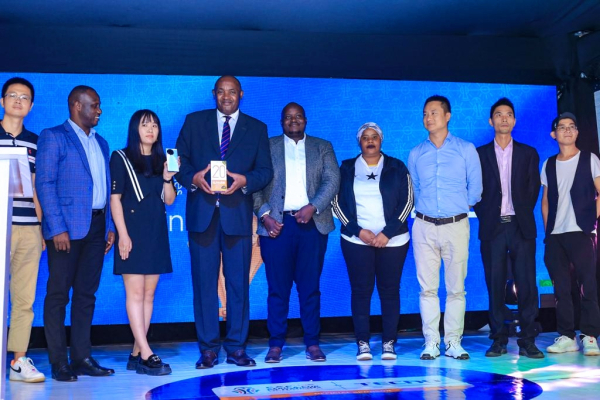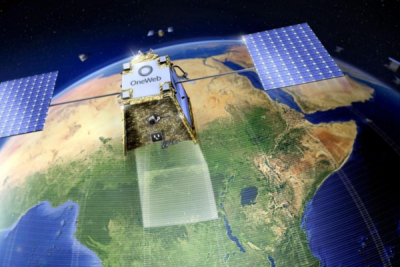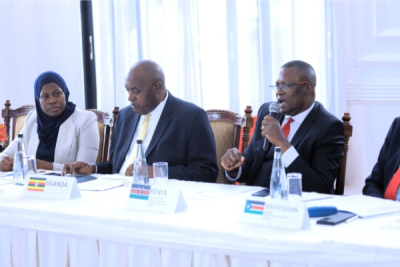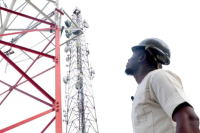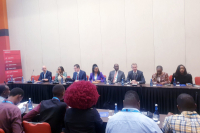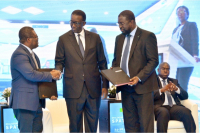
Telecom (150)
Local authorities are encouraging smartphone manufacturers to shift a portion of their production to their region, a move aimed at boosting smartphone usage by reducing prices.
Uganda’s Minister of ICT and National Orientation, Chris Baryomunsi, has called on smartphone manufacturers to establish production facilities in Uganda, a move aimed at boosting smartphone penetration in the country. The invitation was extended during the launch of a 5G smartphone model by Tecno, in collaboration with a local mobile operator, in Kampala on Friday, January 12.
Baryomunsi highlighted the benefits for smartphone manufacturers investing in Uganda, citing the growing demand in a market of 50 million people. Furthermore, he suggested that Uganda could serve as a gateway to the African continent and its 1.4 billion population.
The minister expressed the government’s support for technological innovation, stating, “We support the innovation and the government has deliberately promoted the policy of legalizing communications and airwaves. So far, we have since moved from traditional means of communication and have created space for innovations and technologies in Uganda so that we move with the rest of the world in this era of digital transformation. Continue making the innovations and technologies and we are ready to embrace all these cutting-edge technologies including these devices.”
The call for multinational smartphone manufacturers to establish assembly plants in Africa is becoming increasingly common. The goal is not only to create local jobs but also to reduce smartphone costs and increase affordability for the population.
In line with this trend, Kenya commissioned a smartphone assembly plant last October. The plant is expected to produce between 1.2 and 1.4 million smartphones annually, with retail cost at 7,500 Kenyan shillings ($46.58). Earlier that year, Angola signed a memorandum of understanding with China’s ZTE to establish a mobile phone factory, set to be operational this year.
It’s worth noting that, according to DataReportal, Uganda is projected to have 30.55 million active mobile subscriptions in 2023, accounting for 63.8% of the total population.
Adoni Conrad Quenum
Nigeria is easing regulations for internet service providers (ISPs) in a bid to connect more of its vast population to the internet. This move comes as a major American player strengthens its hold on the market through a partnership with a local provider.
US internet service provider (ISP) Parallel Wireless is teaming up with Nigeria's Hotspot Network Limited to bring connectivity to 500 rural areas, the companies announced last week.
The partnership, announced last week, aims to improve the quality of life for millions by enabling access to essential services like healthcare, education, and finance in underserved regions. The project will leverage both 2G and 4G technologies "to connect as many residents as possible," said Yisrael Nov, Parallel Wireless' executive vice president of worldwide sales.
The initiative aligns with Nigeria's broader ambitions for digital transformation. As one of Africa's most mature tech ecosystems, the country aims to bridge the digital divide and maximize the impact of its technology policies. President Bola Tinubu's administration has set an ambitious target of connecting 70% of the population to broadband by 2025.
With a population of over 220 million, Nigeria boasts the largest consumer market in Africa. However, internet penetration remains uneven, with rural areas significantly lagging behind urban centers. As of 2023, only 55.3% of Nigerians had internet access, according to data from DataReportal.
Adoni Conrad Quenum
According to DataReportal stats, in early 2023, Libya’s internet penetration rate was 45.9% for 3.14 million users. To fill the gap, internet service providers are teaming up with major international groups.
On Wednesday, December 13, Eutelsat OneWeb, a British satellite Internet provider, announced a memorandum of understanding with Libyan Internet service provider Rafawed Libya for Telecommunications & Technology (RLTT) to use its constellation of low-Earth orbit (LEO) satellites to improve the quality of high-speed, low-latency connectivity throughout Libya. The contract will take effect from 2024.
"We have been working with Eutelsat Group for several years now and are excited to bring its high-speed, low-latency connectivity to our customers across the oil and gas, cellular backhaul, and humanitarian sectors. By combining both LEO and GEO-powered connectivity, we can meet the different needs of our customers without having to use multiple providers. Through this exclusive deal, we look forward to bringing unmatched connectivity across Libya," said Taha Ellafi, Chairman of RLTT.
The partnership, which is part of the British satellite Internet provider's planned African expansion, reinforces the longstanding partnership between the Libyan operator and Eutelsat, dating back to 2013. With Eutelsat's recent merger with OneWeb, the company is now equipped to provide not only geostationary solutions but also low-Earth orbit alternatives. These expanded capabilities are being passed on to RLTT as part of the enhanced contract.
"We continue to see huge demand for high-speed connectivity as we roll out our LEO services globally, with the wide variety of potential use cases that the increased resilience offers proving highly attractive to customers. By building on existing customer relationships, we can grow the business in international markets and continue to bridge the digital divide globally," explained Cyril Dujardin, Co-General Manager of Eutelsat OneWeb.
Adoni Conrad Quenum
Digital transformation offers a huge potential, notably for African countries. To capitalize on those opportunities, countries need to enhance connectivity. This is why like most African countries, South Africa is focused on developing broadband internet.
South African authorities introduced a Broadband Access Fund on Tuesday, November 28, specifically designed to support small and medium-sized businesses (SMBs) providing internet services in KwaZulu-Natal province. The fund aims to bridge the digital divide by providing partial subsidies to these SMBs, enabling them to connect 50,000 households and establish 3,000 community Wi-Fi access points.
The initiative has already benefited sixteen internet service providers, who will be tasked with extending broadband connectivity to underserved areas and reducing access costs. These efforts are expected to improve broadband penetration, increase employment opportunities, and stimulate economic growth in the region.
"Through the Broadband Access Fund, the government has reduced the cost of data considerably with packages from as little as R5 [~$0.26] per day Wi-Fi connectivity. We are enabling our people to have access to the Internet in an affordable, secure and safe way. We intend to connect more than a million households over the next six months,” commented Mondli Gungubele, South Africa's Minister of Communications.
The establishment of the Broadband Access Fund aligns with the President's job stimulus program, providing partial subsidies to internet service providers. This initiative forms part of the second phase of the SA Connect project, launched on Saturday, November 4, which aims to guarantee all South Africans access to affordable broadband connectivity.
Adoni Conrad Quenum
On the African continent where value-added digital services are getting appealing by the day, telecom operators are adapting their strategies to remain competitive. In that context, Orange is multiplying innovations, in line with its “Lead the Future” vision, to meet subscribers’ needs.
Earlier today, November 24, Orange Middle East and Africa (OMEA) announced the launch of Max it, its super app. Currently, the app is available in five African countries, namely Cameroon, Senegal, Mali, Burkina Faso, and Botswana. It will be gradually rolled out with functional updates in the twelve other countries that make up Orange’s market in the Middle East-Africa zone.
According to Orange CEO Christel Heydemann, "Max it perfectly reflects Orange’s spirit of innovation in Africa and the Middle East. By bringing together all our services and those of numerous partners, this application strengthens our position as a multi-service operator and our desire to offer the best of digital services to all our customers."
The digital solution aggregates three essential service offerings into a unified smartphone interface. Orange customers can seamlessly manage their mobile or fixed lines, and access a wide range of local and international financial services including money transfers, merchant payments, bank transfers, credit, and savings. Additionally, users can access diverse digital content such as online games, music, TV, videos, news, and more through an inclusive marketplace. The interface even facilitates the purchase of tickets for events like concerts and transportation services.
“Max it is accessible to all, regardless of operator, with Orange Money as the payment base, while accepting other solutions for paying for purchases via the super-app. Available in different languages and integrating local specificities for greater inclusion, Max it will enable the development of new uses while meeting the different needs of its users' daily lives,” Orange indicates in a release.
In sub-Saharan Africa, the mobile phone is the main gateway to the digital world. With a current smartphone adoption rate of 51%, projected to reach 87% by 2030, Orange is poised to capitalize on this potential by expanding its reach through its app over the next seven years. Aiming to connect with a wider audience, Orange has set a target of registering nearly 45 million active Max it users by 2025, building upon its existing base of 32 million monthly Orange Money users.
Africa has the lowest Internet penetration rate in the world. Authorities are joining forces with various partners to improve these figures, and are also considering collective action to achieve their goal.
The East African Community has decided to invest in the installation of a satellite to provide Internet access to the entire sub-region. The decision was taken at the ministerial meeting of the Information and Communication Technology Infrastructure Development Group of the Northern Corridor Integration Projects (NCIP), held on Wednesday, November 8, and Thursday, November 9 in Nairobi, Kenya.
"The Ministers agreed to fast track the modalities of establishing a Regional Owned Satellite for communication that will provide high-quality, dependable broadband internet services and broadcasting capabilities," reads the joint statement issued at the end of the meeting.
The collective solution is the most viable since, according to NCIP coordinator Amb Richard Kabonero, “The cost of a satellite is about USD 300m which is very expensive for individual countries but as a region, we can work together."
The need for Internet connectivity on the continent is constantly growing with the ongoing digital transformation. Traditional Internet service providers are unable to cover all areas, especially rural and landlocked ones, for a variety of reasons. According to DataReportal, the Internet penetration rate in East Africa was 23.1% in January 2023. The sub-region lags behind other parts of the continent, and satellite can be an interesting alternative.
It is worth mentioning that the cost of satellite internet is still high for average Africans. In January 2023, Starlink started deploying its satellite services in African countries. To access Starlink’s services, users need to buy kits that cost around $372 in the cheapest country (Nigeria) and almost $650 in Benin, where the service was launched earlier this month.
Adoni Conrad Quenum
In line with its digital ambitions, the Nigerian government wants to connect 70% of the population to broadband Internet by 2025. The executive, in collaboration with its partners, is actively implementing measures to accomplish this crucial objective.
Tizeti Network Limited, a solar-based internet service provider, announced on Wednesday, November 1 its plan to connect 15 Nigerian states thanks to long-term funding from the Chapel Hill Denham Nigerian Infrastructure Investment Fund (NIDF).
"Chapel Hill Denham is excited to partner with Tizeti in the expansion of a fast, reliable broadband network across Nigeria. The digital economy is a key strategic pillar for Nigeria to accelerate its economic and social development, and providing access to affordable internet services is crucial to achieving the true potential of digitization," said NIDF CEO Anshul Rai.
The new initiative is in line with NIDF's strategy to fund partners to support the acceleration of digital infrastructure development in Nigeria. The aim is to support the government in its vision of achieving 70% broadband penetration by 2025. For Tizeti Network Limited, the funding supports its expansion objectives in Nigeria, where the company currently serves over 3 million subscribers.
According to Tizeti Network Limited executives, the funding will build the last-mile digital infrastructure that will shift Internet capacity to other Nigerian states and “catalyze sustained development, value creation, improved connectivity, and a deeper and wider digital inclusion net.” As a reminder, in February 2023, the country had 156.9 million Internet subscriptions, according to the regulator. The broadband penetration rate was 48.49%.
Samira Njoya
In the last decade, high-speed internet consumption has grown significantly across Africa. With Covid-19 bringing about new usages, the demand has further increased. Telecom operators are actively mobilizing to efficiently meet these heightened requirements.
The CEOs of six major telecoms groups operating in Africa - Orange, MTN, Airtel, Vodacom, Axian, and Ethio Telecom - have pledged to develop digital inclusion on the continent. On Tuesday, October 17, at the Mobile World Congress (MWC) in Kigali, Rwanda, they expressed their willingness to continue investing in the local telecoms market during an exchange with Paul Kagame, President of the Republic of Rwanda, host of the MWC and also Chairman of the Board of Directors of Smart Africa.
In a joint statement, Jérôme Hénique, CEO of Orange Middle East and Africa, Ralph Mupita, CEO of MTN Group, Segun Ogunsanya, CEO of Airtel Africa, Shameel Joosub, CEO of Vodacom Group, Frehiwot Tamru, CEO of Ethio Telecom, and Hassanein Hiridjee, CEO of Axian Group, said: "Together, we passionately believe in the power of mobile as a catalyst for economic and social inclusion across Africa. We openly invite other African Heads of state to engage with us in the search for solutions focused on deepening digital and financial inclusion on the continent for the benefit of all African citizens."
The telecom groups have already identified potential solutions that can facilitate comprehensive coverage of the continent with a high-quality mobile broadband network, ensuring affordable access to services. But for these solutions to materialize, they stressed the need for African governments to get involved and engage in in-depth collaboration.
Telecom operators are calling for tax and policy reforms. They believe that by reducing the amount of taxes on different segments (equipment, services, accessories, telephones, etc.), their operating costs will be positively impacted. The resulting reduction in expenditure will strengthen investment capital for the development of telecoms infrastructures across the continent, and support consumption. The same effect should be induced by infrastructure sharing, national roaming, and regulatory policy reform, among others.
Telecom groups are also calling for regulatory support for new models of digital infrastructure financing. The World Bank estimates that $100 billion will be needed to achieve universal connectivity in Africa by 2030. The necessary funds cannot come from telecom companies alone.
Last but not least, climate-friendly infrastructure is an investment that telecom groups are more than willing to make. Given the beneficial impact of solar energy on the operating and maintenance costs of telecom towers and other infrastructures and its contribution to companies' carbon footprints, the CEOs of Orange, MTN, Airtel, Vodacom, Ethio Telecom, and Axian also expressed the need for concerted regulatory policies that promote access to green solutions.
Mobile operators claim to have invested over $70 billion, over the past 10 years, in the construction of mobile infrastructure in Africa. They estimate their annual capital expenditure in sub-Saharan Africa at between $6 and $8 billion, or nearly 20% of their revenues. Although this action today gives nearly 85% of the African population access to mobile broadband connectivity (compared with a global average of 95%), more than 680 million people remain unsubscribed to mobile broadband services either because of the high cost of access, or the inaccessibility of suitable phones.
According to the six groups, the telecoms industry currently contributes 8.1% to the Sub-Saharan region's Gross Domestic Product (GDP). That's around $170 billion. By 2023, the target is to reach $210 billion by raising the mobile Internet usage rate from the current 33% to 50% by 2030.
Last May, the Kenyan Minister of ICT revealed the government's intention to offer locally assembled smartphones for sale. A few months later, thanks to a public-private partnership, the project is becoming a reality.
On Monday, October 30, Kenyan President William Ruto (photo, center) officially launched East Africa Device Assembly Kenya (EADAK), a low-cost smartphone assembly plant located in the town of Athi River. The fruit of a partnership between the government, private telecommunications companies Safaricom and Jamii, and Chinese firm Shenzhen TeleOne Technology, EADAK is expected to assemble between 1.2 and 1.4 million smartphones each year.
They will be available nationwide in the stores of the two local private partners and on the Masoko e-commerce platform.
"The EADAK-assembled smartphone will cost about Sh7,500 and comes with pre-installed e-Citizen to enable more Kenyans to access government services easily [...] We have the benefit of both cheaper devices, approximately 30 percent less, compared to imports and creating jobs locally. The EADAK plant currently employs 300 people," says President William Ruto.
The move is part of the government's drive to accelerate Kenya's digital transformation. Earlier this year, President Ruto secured $390 million in funding from the World Bank to implement various projects aimed at accelerating the digital economy. With EADAK, the Kenyan authorities aim to facilitate access to ICT gadgets for people in a country with 29.7 million active smartphones, which represents 46.9% of the 63.3 million cell phones connected to the network, according to the Communications Authority.
"The launch of EADAK reaffirms our belief in the power of connectivity to transform lives and drive economic progress. [...] This partnership underscores our relentless pursuit to expand 4G access and empower Kenyans through affordable, high-quality smartphones, create employment opportunities, and grow our economy," said Safaricom CEO Peter Ndegwa (photo, right).
Adoni Conrad Quenum
In the past two decades, Africa has increasingly relied on satellite data to accelerate its development. Currently, around ten countries have established their space agencies and are actively pursuing strategies to accomplish their objectives.
On Tuesday, October 24, Senegal’s space agency ASES and the Regional Satellite Communications Organization (RASCOM) signed a memorandum of understanding and strategic partnership on the sidelines of the African Union-European Union Space Dialogue ongoing in Dakar. The agreement aims to strengthen and accelerate Senegal's digitization initiatives by harnessing the capabilities of satellite communication solutions.
As part of the partnership, the two organizations will implement projects to revolutionize various sectors –including telecommunications, agriculture, education, and health– in Senegal through the use of satellite technologies.
The memorandum of understanding reflects Senegal's commitment to becoming a pioneer in the use of space technology to foster innovation in Africa. It is part of the SenSAT space program launched by the government to meet the country's needs in space products and services and to make the space sector a key driver for socio-economic and sustainable development.
For RASCOM, the protocol aligns entirely with its mission of bridging the digital divide in Africa, ensuring comprehensive connectivity in a sustainable and viable way.
The successful implementation of the partnership will help bridge the digital divide in Senegal, by leveraging cutting-edge satellite communication technologies and providing essential public services to the entire population, including those in far-flung areas.
The agreement comes just a few days before the launch of Senegal's first satellite (due on November 10).
Samira Njoya
More...
Satellite Internet is gaining ground in Africa. Since the beginning of the year, American operator Starlink has been rolling out its services on the continent. New operators are also eying the continent.
Last week, Chinese satellite communication solutions provider StarWin announced the successful testing of its Electronically Steered Phased Array (ESA) antenna terminal for Communications on the Move (COTM) on the high-speed Ka-band HYLAS 4 satellite of Avanti Communications, a UK provider of high-speed satellite connectivity. The aim is to provide broadband connectivity across Africa to government, military, and corporate clients.
"We are thrilled to have joined forces with Avanti for this revolutionary project. The successful testing of our Ka-band ESA terminal is just the beginning of a new era. We look forward to further advancements in the industry. The future of mobile connectivity in Africa looks brighter than ever," said Amelia Liu, COO and co-founder of StarWin.
Satellite Internet is an attractive alternative for the African continent, especially for people living in remote areas. Due to various constraints, conventional Internet providers are unable to reach these areas, hindering the pursuit of a key sustainable development objective ensuring affordable Internet access for all in the least developed nations.
Avanti, with its fleet of four HYLAS Ka-band satellites, offers 50 GHz capacity and covers more than 1.7 billion people in 118 countries.
"This latest partnership with StarWin will allow us to expand our offering in Africa’s defense and security sector, by providing greater on-the-move capabilities. This new chapter will further our mission to deliver secure and reliable connectivity to those who need it most," said Donald Walker, Senior Vice President of Government and Defence at Avanti.
Adoni Conrad Quenum
Recognizing the necessity of affordable and high-quality Internet services for an effective digital economy, the South Sudanese government and its partners have been working, for years now, to strengthen local data capabilities.
Thuraya Telecommunications Company and YahClick, two subsidiaries of Al Yah Satellite Communications Company (Yahsat), a leading provider of satellite solutions in the United Arab Emirates, announced on Monday, October 23 the signing of a partnership agreement with Gate for Technologies (G4T), a company offering integrated systems design and communications services in South Sudan. One of the aims of the partnership is to provide satellite connectivity solutions in several high-growth sectors in South Sudan.
As part of the partnership, Thuraya's satellite technology will be deployed in the country to connect remote communities. Yahsat will also collaborate with humanitarian agencies based in South Sudan, providing essential connectivity to support underserved areas.
"The new service partner agreement with Gate for Technologies reinforces our commitment to South Sudan and Africa. As the country seeks to rebuild critical sectors of the economy, consistent and reliable connectivity will increasingly play an integral role in furthering socio-economic development," said Ali Al Hashemi, Yahsat Group CEO.
The partnership, which began its implementation with the launch of Thuraya and YahClick services in the country, is part of efforts by the government and its partners to develop the national telecommunications infrastructure and provide e-government services.
The service agreement will leverage G4T's market presence and partnerships with government entities, non-governmental organizations (NGOs), and mobile network operators (MNOs) to develop the telemedicine, education, and oil and gas sectors. It is a response to the growing demand for connectivity solutions but, its ultimate aim is to help accelerate growth, development, and digital transformation in the country.
Samira Njoya
In recent years, mobile fraud and cybercrime have risen significantly in Africa's digital space. Governments are, therefore, stepping up measures to put an end to these crimes.
Burkina Faso will reduce the number of SIM Cards each subscriber can register with a single telecom operator from five to two. The measure was adopted by the Council of Ministers in Ouagadougou on Wednesday, October 18.
According to Aminata Zerbo-Sabané, Minister of Digital Transition, Posts and Electronic Communications, the government's measure is aimed at combating insecurity in the country.
"Considering the security situation in Burkina Faso and the improper use of electronic communication services, the government, during today's Council meeting, has decided to enforce a decree aimed at strengthening the regulatory framework governing the identification of electronic communication service subscribers, clients, and providers. It's important to note that there was already the December 2018 decree overseeing that identification process. However, after several years of implementation, challenges and deficiencies have been observed,” she said.
The bill adopted by the Council of Ministers addresses these shortcomings and provides for several other measures, including streamlining the identification requirements for subscribing to electronic communication services, as well as the obligation for operators to sell SIM cards in their agencies or approved sales outlets. Operators and their customers have three months to comply with these new measures.
The new measures are expected to facilitate improved monitoring of SIM card access and enhance the credibility of electronic communication service user data. These actions are aimed at effectively countering any illicit exploitation of these services.
Samira Njoya
Digital transformation has greatly accelerated in Africa over the past three years. Aware of the stakes involved, African governments are taking initiatives to develop digital technology and democratize the Internet.
In Congo, the telecom regulator ARPCE will deploy 3rd generation (3G) mobile technology in 184 white zones across the country. The new territories, located in the Likouala and Cuvette-Ouest departments, were identified on Tuesday, October 11 in Brazzaville, during the presentation of a study commissioned by the regulator to open up white zones.
According to the study, carried out by the consulting firm Smart World Partners, by bringing 3G to these new localities, at least 250,000 inhabitants will be reached by high-speed telecom services. Among other things, the technology will give them the ability to communicate better, access online learning or business opportunities, get better informed, and even access certain government services that are going digital.
The 3G rollout plan falls within the framework of the Digital Transformation Acceleration Project (PATN) and the national strategy for the development of the digital economy, Congo Vision 2025. It will be financed by Congo’s universal service fund FASUCE, whose necessity for the development of broadband connectivity and digital inclusion was reaffirmed in the study. To date, the fund has enabled the government to connect 153 localities or "white zones" to high-speed telecoms services and to build 19 multimedia rooms across the country.
During the presentation, after the FASUCE’s importance was reaffirmed, Telecoms Minister Leon Juste Ibombo (photo, center) assured that all the stakeholders involved would make sure the “most remote Congolese localities can access the Internet, online education, and public digital services.” He also called the stakeholders to “responsible commitment” and transparency in the management of identified projects.
Samira Njoya


